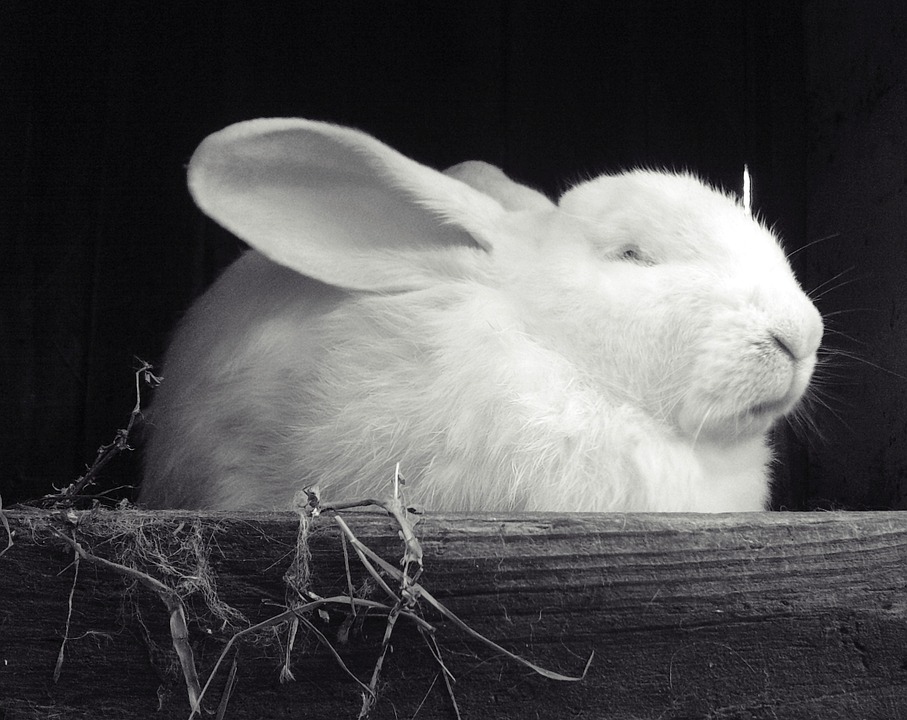This article will provide a comprehensive guide to rabbit vaccinations, addressing the importance of vaccinations, essential vaccines, vaccination schedule, potential risks, and frequently asked questions. Understanding these aspects is critical for ensuring the health and longevity of your beloved rabbit.
Part 1: Introduction to Rabbit Vaccinations

1.1 The Importance of Vaccinations in Rabbit Healthcare
Rabbits are susceptible to several infectious diseases, some of which can be fatal. Vaccination plays a vital role in protecting rabbits from these diseases and promoting their overall health. Vaccinating your rabbit can significantly reduce the risk of contracting serious illnesses, potentially saving their life.
1.2 Understanding the Immune System
Vaccines work by mimicking natural infection, prompting the rabbit's immune system to develop antibodies against specific diseases. The immune system then remembers these pathogens, allowing it to mount a rapid and effective response if exposed in the future.
Part 2: Essential Vaccines for Rabbits

2.1 Myxomatosis Vaccine
Myxomatosis is a highly contagious viral disease that can be fatal to rabbits. It is spread through contact with infected rabbits, fleas, and mosquitoes. The myxomatosis vaccine, typically administered as a subcutaneous injection, provides strong protection against this deadly disease.
2.2 Rabbit Haemorrhagic Disease (RHD) Vaccine
Rabbit Haemorrhagic Disease (RHD) is another highly contagious and often fatal viral disease affecting rabbits. It is spread through contact with infected rabbits, their faeces, and contaminated materials. Two types of RHD vaccines are available: RHD1 and RHD2. RHD1 protects against the original strain of RHD, while RHD2 provides protection against a newer and more virulent strain, RHD2.
2.3 Pasteurellosis Vaccine
Pasteurellosis is a bacterial infection that can cause various health problems in rabbits, including respiratory issues, abscesses, and even death. It is often contracted through contact with infected rabbits or the environment. While not as prevalent as myxomatosis and RHD, vaccination can reduce the risk of developing this potentially serious infection.
Part 3: The Vaccination Schedule
3.1 Initial Vaccination Course
The initial vaccination course for rabbits typically involves two doses, with a booster given 2-4 weeks after the first dose. This initial course builds up the rabbit's immunity to the target diseases.
3.2 Booster Vaccinations
Booster vaccinations are essential to maintain immunity levels and provide ongoing protection against diseases. The frequency of booster shots varies depending on the vaccine and the rabbit's individual health status. Your veterinarian can advise on the appropriate booster schedule for your rabbit.
3.3 Age of Vaccination
The recommended age for initial vaccinations can vary slightly depending on the breed and health of the rabbit. However, most veterinarians recommend vaccinating rabbits between 6 and 8 weeks of age.
Part 4: Understanding Risks and Potential Side Effects
4.1 Potential Side Effects
While vaccinations are generally safe, some rabbits may experience mild side effects after vaccination, such as:
- Slight swelling or redness at the injection site.
- Mild lethargy or loss of appetite.
- Temporary sneezing or runny nose.
These side effects are usually temporary and resolve on their own within a few days. If you notice any concerning symptoms, consult your veterinarian immediately.
4.2 Anaphylaxis
In very rare cases, rabbits may experience an allergic reaction to the vaccine, known as anaphylaxis. This is a serious condition that can be life-threatening and requires immediate veterinary attention. Symptoms include difficulty breathing, swelling of the face or tongue, and collapse.
4.3 Contraindications
Certain conditions may make vaccination unsuitable for some rabbits. These include:
- Young or very old rabbits.
- Rabbits with compromised immune systems.
- Rabbits currently experiencing an illness.
It is crucial to discuss your rabbit's health history with your veterinarian before vaccination to ensure it is safe and appropriate.
Part 5: Selecting the Right Veterinarian
Choosing a veterinarian with experience in rabbit care is crucial for ensuring your rabbit receives appropriate vaccination and treatment. Look for a veterinarian who:
- Has a dedicated rabbit practice or experience in treating rabbits.
- Is knowledgeable about the latest vaccination guidelines and techniques.
- Offers a safe and comfortable environment for rabbits.
Part 6: Preparing Your Rabbit for Vaccination
Before taking your rabbit for vaccination, it is important to:
- Schedule an appointment in advance to avoid unnecessary waiting times.
- Ensure your rabbit is healthy and free from any pre-existing illnesses.
- Bring any relevant medical records or vaccination history.
- Discuss any concerns or questions you may have with the veterinarian.
Part 7: Post-Vaccination Care
Following vaccination, it is essential to:
- Monitor your rabbit for any signs of side effects.
- Keep your rabbit calm and comfortable in a quiet environment.
- Provide fresh food and water.
- Follow the veterinarian's instructions for post-vaccination care.
Part 8: Vaccinations and Other Preventive Measures
8.1 The Role of Flea Control
Fleas can carry diseases that can affect rabbits, including myxomatosis. Therefore, regular flea control is essential for protecting your rabbit's health.
8.2 Housing and Environmental Hygiene
Maintaining a clean and hygienic environment for your rabbit can significantly reduce the risk of infection. This includes regular cleaning of the hutch or cage, providing fresh bedding, and avoiding contact with wild rabbits.
Part 9: FAQs
9.1 Is it safe to vaccinate my rabbit?
Yes, vaccinations are generally safe for rabbits and offer excellent protection against deadly diseases. However, as with any medical procedure, there are potential risks and side effects. It is essential to discuss these with your veterinarian and ensure your rabbit is healthy enough for vaccination.
9.2 How often does my rabbit need booster vaccinations?
The frequency of booster vaccinations can vary depending on the vaccine and the rabbit's individual health status. Your veterinarian can provide guidance on the appropriate booster schedule for your rabbit.
9.3 Can I vaccinate my rabbit myself?
No, it is not safe to vaccinate your rabbit yourself. Vaccinations should be administered by a qualified veterinarian to ensure proper technique and prevent complications.
9.4 What if my rabbit has already had myxomatosis or RHD?
If your rabbit has already contracted myxomatosis or RHD, it is unlikely to develop immunity from vaccination. However, vaccination can still protect against other strains of the virus and help prevent future infections.
9.5 Is it too late to vaccinate my older rabbit?
It is never too late to vaccinate your rabbit, even if it is older. Vaccination can still provide protection against deadly diseases and improve your rabbit's overall health and lifespan.
9.6 What are the signs of myxomatosis and RHD?
- Myxomatosis: Swollen eyelids, eyes, nose, and ears; tumours on the body; lethargy; loss of appetite; and breathing difficulties.
- RHD: Sudden death, loss of appetite, lethargy, fever, seizures, and bleeding from the nose or mouth.
If you notice any of these symptoms in your rabbit, seek immediate veterinary attention.
9.7 My rabbit is allergic to something else; will it be allergic to vaccines?
It is possible for rabbits to have allergies to various substances, including vaccines. If your rabbit has a history of allergies, it is essential to inform your veterinarian before administering any vaccinations.
9.8 What if my rabbit shows signs of illness after vaccination?
If your rabbit develops any signs of illness after vaccination, it is crucial to contact your veterinarian immediately. They will be able to assess the situation and provide appropriate treatment if necessary.
Everyone is watching
-

Do Rabbits Lay Eggs? (The Surprising Truth)
OTHER TYPES OF PETSThis article will unravel the common misconception that rabbits lay eggs, exploring the fascinating world of r...
-

What's a Group of Rabbits Called? (A Comprehensive Guide)
OTHER TYPES OF PETSThis article delves into the fascinating world of rabbits, exploring the various terms used to describe a grou...
-

Can Rabbits Eat Grapes? A Guide to Safe Rabbit Treats
OTHER TYPES OF PETSThis comprehensive guide will explore the safety and suitability of grapes for rabbits, providing detailed inf...
-

Predators That Hunt Rabbits: A Guide to Natural Enemies
OTHER TYPES OF PETSI've always been fascinated by the circle of life, that delicate dance between predator and prey. Growing up ...
-

Are Rabbits Nocturnal Animals?
OTHER TYPES OF PETSThe question of whether rabbits are nocturnal animals is a fascinating one, with a surprisingly complex answer...
